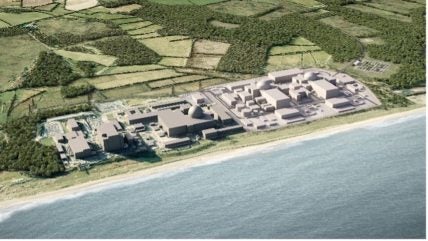
The first budget of the UK Labour Government included decisions related to both the Sizewell C NPP and to plans for small modular reactors (SMRs). However, this was clearly not a high priority in the 170-page budget. The small eight paragraph section on the Department for Energy Security & Net Zero (DESNZ) included just two short paragraphs on nuclear.
DESNZ was allocated total funding of £14.1bn ($18.2bn) in 2025-26 up 22.0% from 2023-24. The main paragraph (4.75) notes that “Making Britain a clean energy superpower is one of the five missions of this government. Great British Energy (GBE) will be at the heart of the mission.” GBE is allocated £100m million capital funding in 2025-26 “for clean energy project development” and £25m to establish GBE as a company, headquartered in Aberdeen. Investment activity will be undertaken by the National Wealth Fund, “helping it to make initial investments as quickly as possible”.
The budget says “new nuclear will play an important role in helping the UK achieve energy security and clean power while securing thousands of good, skilled jobs” (para 4.80). It provides £2.7bn to continue development of Sizewell C through 2025-26. “The process to raise equity and debt for the project will shortly move to its final stages and will conclude in the Spring. As with other major multiyear commitments, a Final Investment Decision (FID) on whether to proceed with the project will be taken in Phase 2 of the Spending Review.” Phase 2 is expected in the Spring.
However, on 30 August DESNZ announced a Sizewell C Development Expenditure (Devex) Scheme that would benefit from up to £5.5bn in subsidies to get to a FID with support mainly comprising equity injections by the UK government. The £2.7bn announced in the budget is not new funding and would be taken either from £5.5bn already made available or through a separate subsidy scheme that would be established at the point of the FID.
Sizewell C, in Suffolk, is expected to host two EPR reactor units producing 3.2 GWe similar to the Hinkley Point C plant, under construction in Somerset. EDF Energy submitted a development consent order (planning application) for the plant in May 2020, which was granted in July 2022. In March 2023, the Environment Agency granted environmental permits for the plant.
The UK government in August 2023 made available a further £341m of previously allocated funding to help prepare the site for construction on top of the government’s existing £870m investment made available from the DESNZ Capital Budgets. EDF said in November 2022 that construction of Sizewell C remained subject to a FID that depended on the achievement of certain key stages, in particular the ability to raise the necessary financing. DESNZ said that, subject to receiving the relevant approvals, the government said then it was aiming to reach FID before the end of 2024. However, the FID will now be taken in Phase 2 of the Spending Review.
The decision was predictably criticised by opponents of the Sizewell C project. Alison Downes from Stop Sizewell C noted: “For a government that criticised the opposition for playing fast and loose with the nation’s finances, the Chancellor is surprisingly happy to do the same, allocating another £2.7bn of taxpayers’ money on risky, expensive Sizewell C, without making any guarantee of a Final Investment Decision being taken.
Jenny Kirtley, Chair of Together Against Sizewell C described the decision as appalling. “It’s staggering that Labour, even though they cast doubt about the future of the project by stating, “a Final Investment Decision on whether to proceed with the project will be taken in Phase 2 of the Spending Review”, have increased the outlay of UK taxpayer funds on EDF’s Sizewell C white elephant by a further £2.7bn.”
On SMRs, the Budget said: “Great British Nuclear’s (GBN’s) Small Modular Reactor competition is ongoing and has entered the negotiation phase with shortlisted vendors.” (para 4.81). In September, GBN concluded the initial tender phase of the competition and down-selected four companies – GE-Hitachi Nuclear Energy International, Holtec Britain, Rolls-Royce SMR, and Westinghouse Electric Company UK. GBN then said it expected the final decision on the technologies to be supported would be taken by the end of the year. It had previously been set for summer 2024. The Budget has now deferred that decision until the Spring 2025.
UK Nuclear Industry Association CEO Tom Greatrex said it was “critical” to reach a decision “as soon as possible without any further delays to the now published timeline”. He added: “Confidence in the UK government’s pronouncements on support for SMRs rests on fulfilling commitments made today. It is vital for supply chain confidence as well as driving the wider nuclear ambition.”
Meanwhile, on 28 October the UK Government published a commercial pipeline document for GBN suggesting that the procurement of a project delivery partner for each SMR technology provider selected would be for an “estimated contract value” over 10 years of £600-800m. It lists an estimated procurement start date in 2025 and a contract start date of September 2026. It estimates that a separate £200m contract for “Balance of Plant – Manufacture, supply, installation” envisaged procurement starting in 2028 with the contract starting in 2030.






